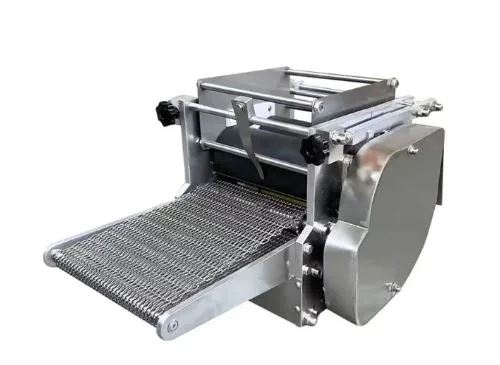The Science of Perfect Tortillas: Tips and Tricks
Making the perfect tortilla might seem simple at first glance flour, water, oil, and salt but achieving the ideal texture, flavor, and consistency requires both art and science. Whether you’re running a busy restaurant or operating a large-scale production facility, understanding how ingredients, temperature, and machinery work together can make all the difference.
In recent years, technology has revolutionized the way tortillas are produced, helping businesses create consistent, authentic results at scale. The key lies in using a Commercial Tortilla Machine that balances efficiency with craftsmanship.
Why Consistency Matters in Tortilla Production
Consistency isn’t just about appearance, it’s the foundation of customer satisfaction. In restaurants or food production, every tortilla must have the same thinness, flexibility, and flavor profile. When tortillas vary in size or texture, it disrupts the dining experience and can affect brand reliability.
That’s why many commercial kitchens now rely on automation to ensure precise dough portions, even heat distribution, and uniform pressing. Machines remove human error, ensuring every batch comes out just right, from tacos to burritos and everything in between.
The Science Behind Tortilla Dough
Perfect tortillas start with perfect dough. The dough must have just the right balance of hydration and elasticity to handle rolling and pressing without cracking or sticking.
Here’s what’s happening scientifically:
- Hydration: The water activates the gluten (in flour tortillas) or the starch (in corn tortillas), giving the dough structure and flexibility.
- Resting time: Allowing the dough to rest gives the gluten or masa time to relax, which prevents shrinking or tearing during pressing.
- Temperature control: Warm dough presses more evenly and cooks better, while cold dough tends to dry out or break apart.
When these factors are controlled precisely, tortillas come out soft, pliable, and perfectly cooked every time.
How Commercial Tortilla Machines Improve Production
For commercial operations, manually pressing and cooking tortillas is time-consuming and inconsistent. A Commercial Tortilla Machine streamlines the process, maintaining uniform pressure, temperature, and timing throughout every step.
These machines can:
- Automate dough pressing and cutting: Ensuring every tortilla is the same size and thickness.
- Control cooking temperatures: Preventing undercooked or overbaked results.
- Increase output: Allowing kitchens or factories to produce hundreds or thousands of tortillas per hour.
- Preserve texture and flavor: By evenly distributing heat, machines ensure tortillas remain soft and pliable without losing that homemade taste.
With the right machine, restaurant owners can meet demand efficiently while keeping quality consistent.
Choosing the Right Commercial Tortilla Machine
Selecting a machine isn’t just about speed, it’s about matching the right model to your business size and goals.
Here are a few factors to consider:
- Production Capacity: Small restaurants might only need a semi-automatic press, while large factories benefit from fully automated conveyor systems.
- Type of Tortilla: Machines are typically designed for either corn or flour tortillas, though some can handle both.
- Ease of Cleaning: Food safety standards demand equipment that’s easy to clean and maintain.
- Durability: A sturdy, stainless-steel build ensures longevity and reliable performance under continuous use.
- Energy Efficiency: Modern models are built to conserve energy without compromising on output.
If you’re exploring commercial-grade equipment, resources like tortillamakermachine.com/tortilla-maker-machine offer insight into the latest innovations designed for restaurants and large-scale tortilla production.
Common Mistakes to Avoid in Tortilla Making
Even with advanced equipment, mistakes can happen if the basics aren’t right. Here are some pitfalls to watch for:
- Overmixing the dough: This makes tortillas tough instead of soft.
- Incorrect heat settings: Too hot, and they’ll burn before cooking through; too low, and they’ll turn dry and pale.
- Skipping rest time: Dough that hasn’t rested properly won’t press evenly.
- Neglecting maintenance: Machines that aren’t cleaned regularly can affect flavor and food safety.
A well-trained team and a regular maintenance routine ensure the machine runs smoothly and delivers consistent results.
Bringing Tradition and Technology Together
The best tortillas combine traditional techniques with modern efficiency. While old-fashioned hand-pressing has its charm, the precision and productivity of a Commercial Tortilla Machine make it essential for today’s restaurants and food manufacturers.
By understanding the science behind dough consistency, heat distribution, and machine operation, businesses can craft tortillas that not only taste authentic but also meet the demands of high-volume production.
In the end, it’s about balancing honoring the cultural roots of tortilla-making while embracing the tools that help bring that heritage to tables around the world.
Final Thoughts
Perfect tortillas aren’t just born, they’re engineered through precision, practice, and passion. Whether you’re making a dozen or a thousand a day, the right approach and equipment can transform your process from good to exceptional. For those in the food industry looking to scale efficiently, a reliable commercial tortilla solution like tortillamakermachine.com/tortilla-maker-machine can help you achieve consistent, high-quality results that keep customers coming back for more.





